-
 Bitcoin
Bitcoin $88,575.4133
1.33% -
 Ethereum
Ethereum $1,623.1195
-0.94% -
 Tether USDt
Tether USDt $1.0000
0.01% -
 XRP
XRP $2.1040
-0.96% -
 BNB
BNB $605.9509
0.36% -
 Solana
Solana $139.9862
-0.01% -
 USDC
USDC $1.0000
0.00% -
 Dogecoin
Dogecoin $0.1637
1.09% -
 TRON
TRON $0.2482
1.98% -
 Cardano
Cardano $0.6392
-1.18% -
 Chainlink
Chainlink $13.3059
-1.43% -
 UNUS SED LEO
UNUS SED LEO $9.0739
-4.00% -
 Avalanche
Avalanche $20.1274
-2.31% -
 Stellar
Stellar $0.2484
-4.08% -
 Sui
Sui $2.3116
2.05% -
 Shiba Inu
Shiba Inu $0.0...01252
-0.73% -
 Toncoin
Toncoin $2.9119
-3.20% -
 Hedera
Hedera $0.1725
0.04% -
 Bitcoin Cash
Bitcoin Cash $346.0750
1.19% -
 Hyperliquid
Hyperliquid $18.2428
0.88% -
 Litecoin
Litecoin $79.3117
-2.01% -
 Polkadot
Polkadot $3.7471
-4.36% -
 Dai
Dai $1.0000
0.00% -
 Bitget Token
Bitget Token $4.4341
-0.56% -
 Ethena USDe
Ethena USDe $0.9992
0.00% -
 Pi
Pi $0.6353
0.33% -
 Monero
Monero $216.8188
0.48% -
 Pepe
Pepe $0.0...08105
3.48% -
 Uniswap
Uniswap $5.3764
-1.05% -
 OKB
OKB $51.0901
0.18%
How does an Ethereum ETF affect the price of Ethereum?
The launch of an Ethereum ETF can positively impact the asset's price, increasing accessibility and demand, as demonstrated by past Bitcoin ETF launches.
Feb 17, 2025 at 06:18 pm

Key Points:
- Understanding Ethereum ETFs (Exchange-Traded Funds): An Ethereum ETF is an investment vehicle that tracks the price of Ethereum (ETH), allowing investors to gain exposure to the asset without purchasing it directly.
- Impact on Ethereum's Price: The launch of an Ethereum ETF typically has a positive impact on ETH's price as it increases accessibility and demand for the asset.
Steps Involved in an Ethereum ETF Launch: Several key steps are involved in launching an Ethereum ETF, including:
- Regulatory Approval: The ETF must be approved by regulatory authorities such as the Securities and Exchange Commission (SEC).
- Investment Management: A fund manager is appointed to manage the ETF's portfolio, which will primarily consist of ETH and other related assets.
- Listing: The ETF is listed on an exchange, making it available to investors for trading.
Factors Influencing Ethereum ETF Impacts: The impact of an Ethereum ETF on ETH's price is influenced by various factors, such as:
- ETF Structure: The ETF's structure can impact its demand, e.g., futures-based ETFs may affect price differently than spot-based ETFs.
- Market Volatility: High market volatility can magnify the impact of an ETF on ETH's price.
- Investor Sentiment: Positive investor sentiment towards ETH can further boost its price when an ETF launches.
- Historical Examples: Previous launches of Bitcoin (BTC) ETFs have demonstrated positive impacts on BTC's price, indicating potential similarities for Ethereum ETFs.
Detailed Steps Involved in an Ethereum ETF Launch:
- Regulatory Approval:
The fund manager files an application with regulatory authorities, such as the SEC, outlining the fund's objectives, investment strategy, and risk disclosures. The SEC reviews the application to ensure compliance with applicable laws and regulations. - Investment Management:
A fund manager is appointed to manage the ETF's portfolio. The manager will decide on the specific allocation of assets within the ETF, ensuring that it aligns with the fund's stated investment strategy. - Listing:
Once the ETF has been approved, it is listed on an exchange, such as the New York Stock Exchange or the Nasdaq. This makes the ETF available for trading to investors. - Trading:
Investors can buy or sell the ETF on the exchange, just like they would with any other stock or ETF. The ETF's price will fluctuate based on supply and demand in the market. - Performance Tracking:
The fund manager regularly monitors the performance of the ETF's portfolio. The ETF's objectives and investment strategy are continuously evaluated to ensure alignment with the expected market conditions.
Factors Influencing Ethereum ETF Impacts:
- ETF Structure:
The structure of the ETF can impact its demand, volatility, and price impact. For example, futures-based ETFs can magnify price movements compared to spot-based ETFs. - Market Volatility:
In high-volatility markets, an ETF's launch can have a more pronounced impact on ETH's price due to increased trading activity and speculative behavior. - Investor Sentiment:
Positive investor sentiment towards ETH is a key driver of price increases. An ETF launch can amplify this sentiment, leading to a higher demand for ETH and a resulting price increase. - Institutional Investment:
An Ethereum ETF can attract institutional investors who may not have previously participated in the cryptocurrency market. This inflow of institutional capital can further support ETH's price.
Historical Examples:
- Bitcoin ETF Impact:
The launch of Bitcoin ETFs in late 2021 resulted in significant price gains for BTC. This provides evidence that an Ethereum ETF could have a similar positive impact on ETH's price. - Cryptocurrency Market Sentiment:
Following the Bitcoin ETF launch, the broader cryptocurrency market experienced a period of positive momentum, suggesting that an Ethereum ETF could also boost the overall cryptocurrency market.
FAQs:
- When Will an Ethereum ETF Launch?
The timing of an Ethereum ETF launch is uncertain and subject to regulatory approval. However, several ETF filings are currently in place, indicating the potential for a launch in the near future. - What Are the Potential Benefits of an Ethereum ETF?
An Ethereum ETF offers several benefits, including increased accessibility for investors, diversification of cryptocurrency portfolios, and reduced volatility compared to direct ETH ownership. - What Are the Risks Associated with an Ethereum ETF?
Investors should be aware of the risks associated with ETFs, such as market volatility, regulatory changes, and the potential for the fund manager's investment decisions to deviate from the targeted performance. - How Can I Invest in an Ethereum ETF?
Once an Ethereum ETF is launched, investors can purchase it on the listed exchange through their brokerage account, just like any other stock or ETF.
Disclaimer:info@kdj.com
The information provided is not trading advice. kdj.com does not assume any responsibility for any investments made based on the information provided in this article. Cryptocurrencies are highly volatile and it is highly recommended that you invest with caution after thorough research!
If you believe that the content used on this website infringes your copyright, please contact us immediately (info@kdj.com) and we will delete it promptly.
- AVAX Price Prediction 2025: Will Avalanche Reach New Heights?
- 2025-04-22 17:50:12
- XRP Price Prediction Shows Bullish Momentum After Coinbase Lists Its Futures Contracts
- 2025-04-22 17:50:12
- Bitcoin is surging again, capturing the spotlight in the crypto world.
- 2025-04-22 17:45:12
- Pi Network (PI) Holds Above $0.63: $5 Price Prediction and Whale Accumulation Fuel Optimism
- 2025-04-22 17:45:12
- One of the cryptocurrencies that ranked in the eleventh place, Chainlink, has been in the spotlight as it is traded at $13.12
- 2025-04-22 17:40:12
- Pi Network's Token Structure Promises a Fair Launch
- 2025-04-22 17:40:12
Related knowledge
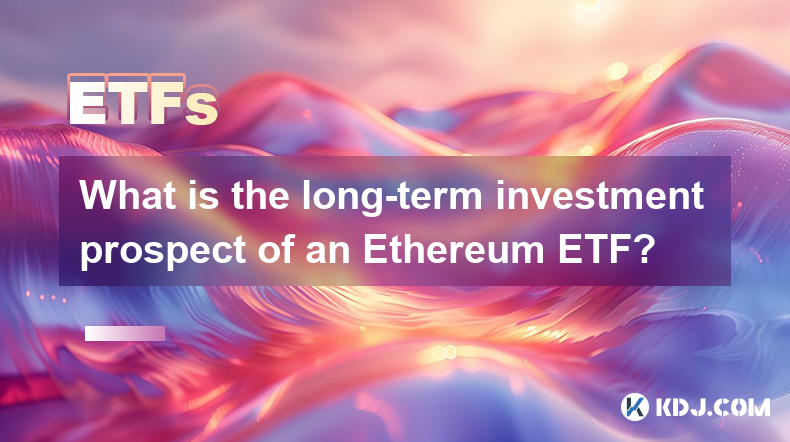
What is the long-term investment prospect of an Ethereum ETF?
Mar 18,2025 at 03:01pm
Key Points:Uncertainty surrounds the long-term prospects of an Ethereum ETF due to regulatory hurdles and market volatility.Approval hinges on regulatory clarity regarding cryptocurrencies, especially concerning investor protection and market manipulation.Successful ETF launches could boost Ethereum's price and adoption, but failure could negatively imp...
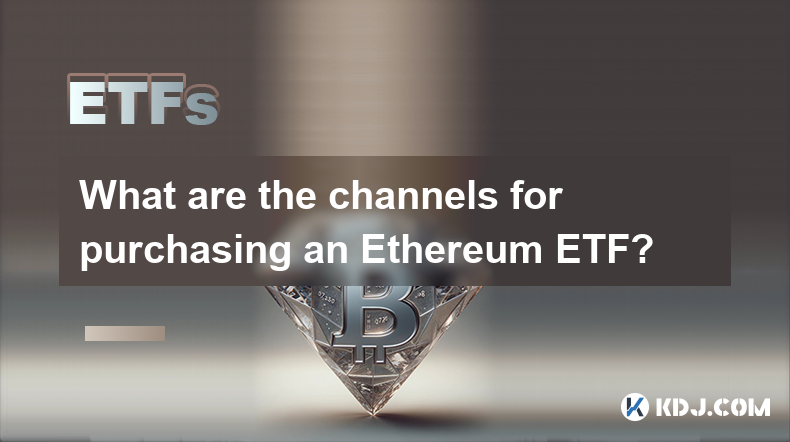
What are the channels for purchasing an Ethereum ETF?
Mar 18,2025 at 01:49am
Key Points:Currently, there are no Ethereum ETFs available for direct purchase by the general public in most major markets.Access to Ethereum exposure through ETFs is limited, mainly through futures-based ETFs.Purchasing Ethereum directly or through other investment vehicles remains a viable alternative.Regulatory hurdles and market complexities signifi...
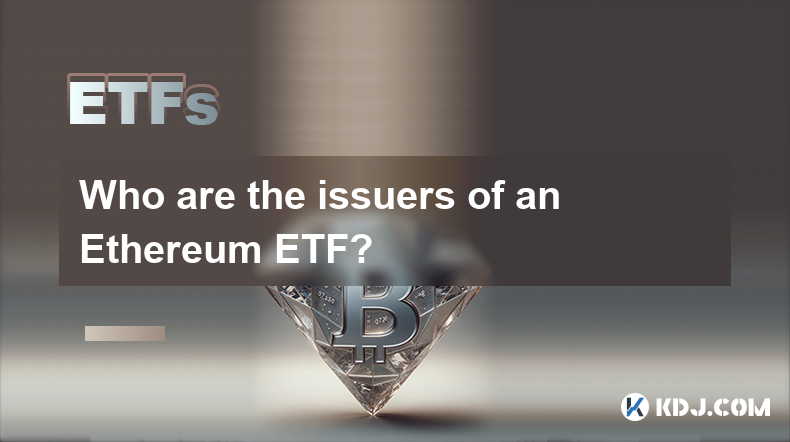
Who are the issuers of an Ethereum ETF?
Mar 19,2025 at 08:07pm
Key Points:There are no currently approved Ethereum ETFs in the US, meaning no single issuer can be definitively named. However, several firms have filed applications.The issuers of potential Ethereum ETFs will be large, established financial institutions, typically asset management companies.The specific requirements for ETF issuers are stringent and o...
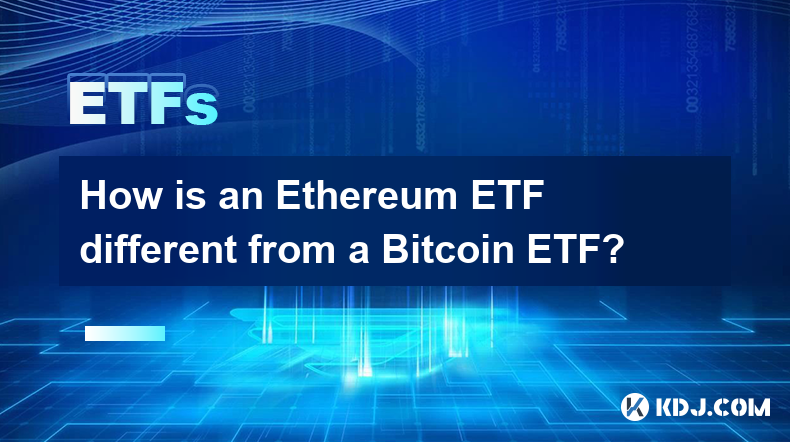
How is an Ethereum ETF different from a Bitcoin ETF?
Mar 17,2025 at 10:55am
Key Points:Underlying Asset: The core difference lies in the underlying asset: an Ethereum ETF tracks the price of Ether (ETH), while a Bitcoin ETF tracks the price of Bitcoin (BTC).Technology and Use Cases: Ethereum's blockchain supports smart contracts and decentralized applications (dApps), creating a distinct technological and investment narrative c...
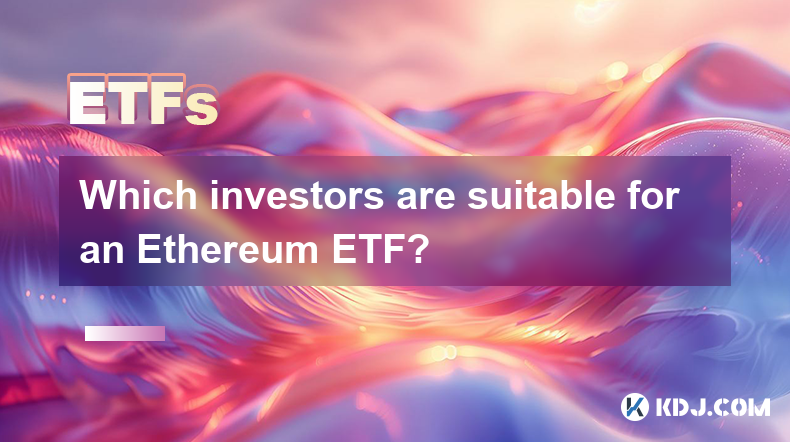
Which investors are suitable for an Ethereum ETF?
Mar 16,2025 at 05:50pm
Key Points:Risk Tolerance: Ethereum ETF investment requires a high risk tolerance due to the volatility of the cryptocurrency market.Investment Goals: Investors seeking long-term growth potential and exposure to the Ethereum ecosystem are suitable candidates.Investment Horizon: A longer-term investment horizon is crucial to weather market fluctuations.U...
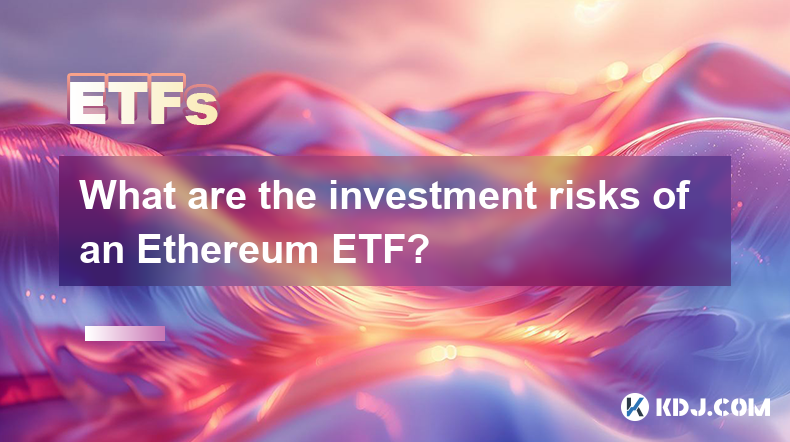
What are the investment risks of an Ethereum ETF?
Mar 18,2025 at 02:12am
Key Points:Price Volatility: Ethereum's price is highly volatile, impacting ETF share prices.Regulatory Uncertainty: Changes in regulatory landscapes can significantly affect ETF trading and performance.Market Manipulation: The potential for market manipulation, particularly in smaller ETFs, exists.Underlying Asset Risk: Risks associated with the Ethere...

What is the long-term investment prospect of an Ethereum ETF?
Mar 18,2025 at 03:01pm
Key Points:Uncertainty surrounds the long-term prospects of an Ethereum ETF due to regulatory hurdles and market volatility.Approval hinges on regulatory clarity regarding cryptocurrencies, especially concerning investor protection and market manipulation.Successful ETF launches could boost Ethereum's price and adoption, but failure could negatively imp...

What are the channels for purchasing an Ethereum ETF?
Mar 18,2025 at 01:49am
Key Points:Currently, there are no Ethereum ETFs available for direct purchase by the general public in most major markets.Access to Ethereum exposure through ETFs is limited, mainly through futures-based ETFs.Purchasing Ethereum directly or through other investment vehicles remains a viable alternative.Regulatory hurdles and market complexities signifi...

Who are the issuers of an Ethereum ETF?
Mar 19,2025 at 08:07pm
Key Points:There are no currently approved Ethereum ETFs in the US, meaning no single issuer can be definitively named. However, several firms have filed applications.The issuers of potential Ethereum ETFs will be large, established financial institutions, typically asset management companies.The specific requirements for ETF issuers are stringent and o...

How is an Ethereum ETF different from a Bitcoin ETF?
Mar 17,2025 at 10:55am
Key Points:Underlying Asset: The core difference lies in the underlying asset: an Ethereum ETF tracks the price of Ether (ETH), while a Bitcoin ETF tracks the price of Bitcoin (BTC).Technology and Use Cases: Ethereum's blockchain supports smart contracts and decentralized applications (dApps), creating a distinct technological and investment narrative c...

Which investors are suitable for an Ethereum ETF?
Mar 16,2025 at 05:50pm
Key Points:Risk Tolerance: Ethereum ETF investment requires a high risk tolerance due to the volatility of the cryptocurrency market.Investment Goals: Investors seeking long-term growth potential and exposure to the Ethereum ecosystem are suitable candidates.Investment Horizon: A longer-term investment horizon is crucial to weather market fluctuations.U...

What are the investment risks of an Ethereum ETF?
Mar 18,2025 at 02:12am
Key Points:Price Volatility: Ethereum's price is highly volatile, impacting ETF share prices.Regulatory Uncertainty: Changes in regulatory landscapes can significantly affect ETF trading and performance.Market Manipulation: The potential for market manipulation, particularly in smaller ETFs, exists.Underlying Asset Risk: Risks associated with the Ethere...
See all articles























































































